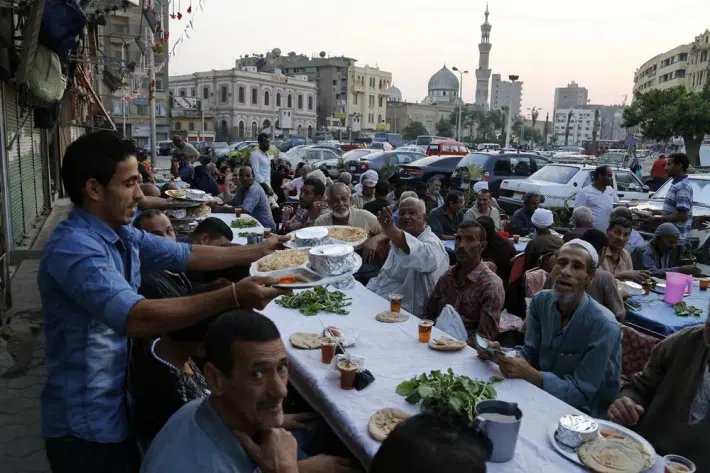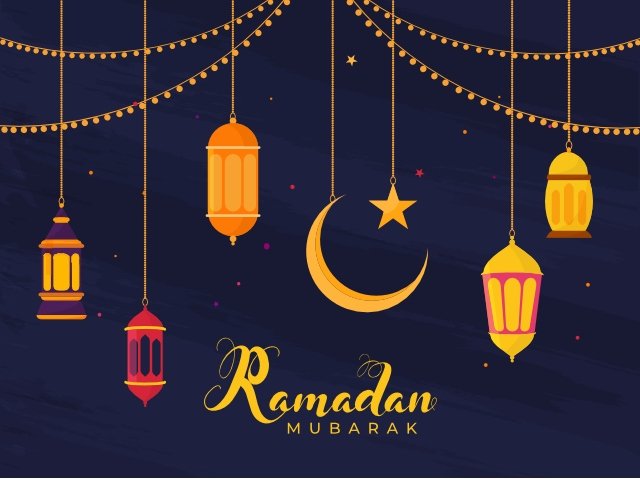For over 2 billion Muslims around the world, Ramadan is about to start around April 12th. As I do every year, I& #39;m going to run you through the basics of what my understanding of Ramadan is, what it isn& #39;t, and answer as many questions you might have about it as I can.
First things first: "Ramadan" is simply the name of the 9th month of the Islamic "Hijri" Calendar - which is a lunar calendar. Where the Gregorian calendar is a solar calendar - based on the Earth& #39;s orbit around the sun, the Islamic calendar is based on the phases of the moon.
The month before it is called Sha& #39;ban and the one after it is Shawwal. Just like the Gregorian calendar, the Hijri calendar has 12 months - but because the lunar months are slightly shorter than Gregorian months, Ramadan actually "moves" about 11 days in the year every year.
A lunar month starts with the crescent moon, or the "Hilal" (الهلال) - the first sight of the moon after the New Moon. A lunar month ends with the next crescent moon. So you can tell Ramadan& #39;s start & progress by simply look at the moon over the next month!
Establishing the start of Ramadan isn& #39;t as simple as it sounds. The Hilal is to be sighted between certain hours, and it can be as thin as a sliver. Its visibility varies across the globe. As countries and communities share the month, they established communal rules.
Some countries require a visual sighting from specialists. Some use math and the lunar calendar. Others have hotlines for the population to call in any sighting. Either way, major Muslim countries around Earth start calling the start of Ramadan - usually with some variation.
During the month of Ramadan, the Quran requires capable Muslims to fast. It is understood that the fast itself means that between the first light of day, and the setting of the disc of the sun, any fasting person is to not consume any food or drink, and to not smoke or have sex.
People are not supposed to fast if they are too young, too old, sick, injured, menstruating, pregnant, traveling, or in any circumstance in which the fast is harmful. Any days missed that can be caught up can be completed afterwards, or if impossible, through other religious acts
(You& #39;re also not supposed to curse during Ramadan, but as we mentioned on @The_Habibis podcast episode today, the hunger and thirst mean that many might not make it through that.) https://thehabibis.transistor.fm/episodes/the-clicks-of-knives-and-forks-on-plates">https://thehabibis.transistor.fm/episodes/...
The first light of day coincides with one of the five daily Muslim prayers - Fajr, and the setting of the disc of the sun coincides with the fourth of the daily Muslim prayers, Magreb. So the fast is from Fajr to Magreb. Length of day varies per location. https://www.aljazeera.com/news/2021/4/7/ramadan-2021-fasting-hours-around-the-world">https://www.aljazeera.com/news/2021...
Before Fajr, we eat a morning meal called Suhoor. While I am certain other traditions exist around the world, in Egypt volunteers called Mesaharati walk the city before Fajr to wake the people and make sure they have time for Suhoor. https://www.arabnews.com/node/1493021/middle-east">https://www.arabnews.com/node/1493...
Suhoor is -often and when possible- a familial meal. Families wake up together, eat together, drink together, maybe pray together, and - depending on the schedule and the time between suhoor and their normal wake-up time - return to sleep.
https://www.tiktok.com/@rehmaaaaaan/video/6812794591977278725">https://www.tiktok.com/@rehmaaaa...
https://www.tiktok.com/@rehmaaaaaan/video/6812794591977278725">https://www.tiktok.com/@rehmaaaa...
During the day, Muslims participate in the fast, and life in many Muslim countries shifts several hours in the day to ensure life can continue. Ramadan is a huge cultural event, with stores and restaurants being open later, and life adjusting to Ramadan. https://www.youtube.com/watch?v=2aU61aKv18Y">https://www.youtube.com/watch...
After Maghreb, the meal that breaks the fast is called Iftar. The Iftar is a communal meal, when possible, and it is to be had as soon as possible. People watch the hands of the clock on this one. As soon as Iftar begins, people tend to eat a small bite, rest, and then eat.
During years without a global pandemic, this is incredibly communal. As Ramadan also emphasizes Muslims& #39; constant requirement to show generosity towards the poor and needed, enormous meals will be served up by mosques and restaurants. https://www.washingtonpost.com/video-games/2020/05/15/ramadan-animal-crossing/">https://www.washingtonpost.com/video-gam...
Obviously, culture and religion mix a lot throughout Ramadan. Things that are religious in nature become cultural as meals and celebrations and lights take over the cities. Things that are cultural get a semi-religious feeling as certain meals or rituals evolve tied to Ramadan.
I was taught for example, to break the fast with a glass of milk, dates, and cashews. If you look at my thread of daily recipes I made for Ramadan last year, you& #39;ll see it in almost every photo. If it isn& #39;t in the photo, I had it before I took the photo. https://twitter.com/tha_rami/status/1254200866321596417?s=20">https://twitter.com/tha_rami/...
Since Muslims live all over the world, in different climates, with different lenghts of day, and speak so many different languages, the Ramadan-related cultural customs, meals, drinks, &celebrations differ wildly.
What remains the same is the fast, and the sense of community
What remains the same is the fast, and the sense of community
I tell this story frequently, but one year I found myself in Sweden during Ramadan The fast was mid-summer, far North - and incredibly long. My hotel didn& #39;t have late-night service and I had just arrived. I wandered the city hoping to find an open restaurant, but I found none.
Finally, I came across a pizzeria that was closed, but the lights were on. I knocked on the door hoping that I would be able to buy anything. Someone opened the door in Swedish, which I didn& #39;t understand, and I asked whether I could order some food this late.
The man said they were closed, I replied I was desperate because it was Ramadan and I wouldn& #39;t be able to eat all day. The man opened the door wide, and I was treated to a tremendous feast with his family and friends. I was made to promise to return every day of my stay.
(I insisted every day, but I was not allowed to pay anything any day. I was a guest to their family, and I was made to feel part of them even though we only shared minimal language.)
To me, this embodies Ramadan. The reasons for the fast are disputed. The hour and day it starts and ends vary. The meals we have, and the rituals we celebrate are cultural.
But the spirit of the fast, togetherness, and community exceeds all of that.
But the spirit of the fast, togetherness, and community exceeds all of that.
Many often ask whether Ramadan is difficult, and while it can be, it is by far my favorite time of year. You don& #39;t have to feel bad for people fasting. In many ways, Ramadan is a celebration of faith, culture, and community. For me, it is my favorite month of the year.
So if you want to wish your Muslims friends your kindness for Ramadan, consider wishing them "Ramadan Mubarak" when they mention the month - it means a blessed Ramadan.
If you have any questions, please go ahead - I& #39;ll try and answer and I can over the next few days.
If you have any questions, please go ahead - I& #39;ll try and answer and I can over the next few days.

 Read on Twitter
Read on Twitter



